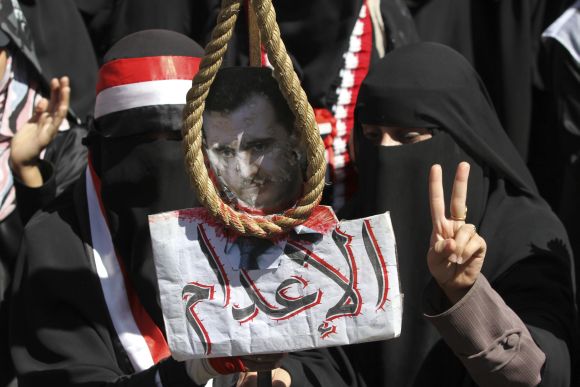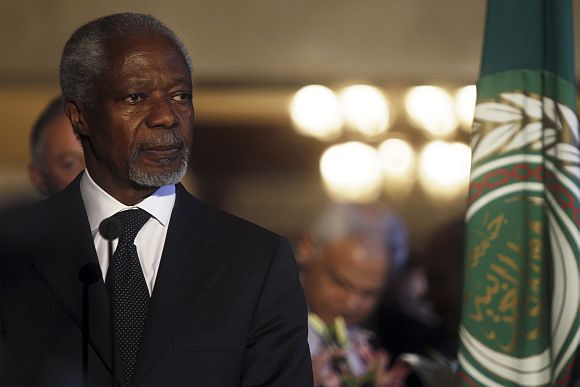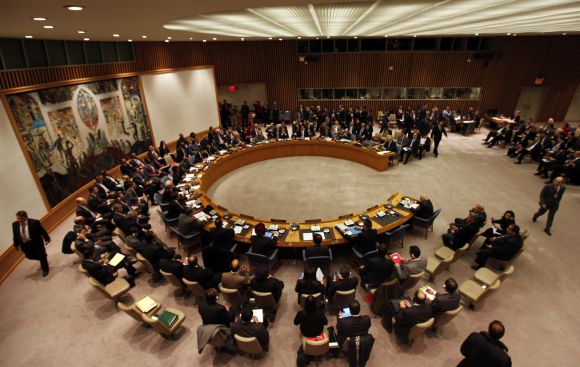India's permanent representative to the United Nations Hardeep Singh Puri explains New Delhi's stand on Syria to Suman Guha Mozumder.
With Syria's strife becoming the focus of international media and diplomatic attention in recent weeks, all eyes are on the United Nations. Many believe that an amicable solution to the bloody conflict that has claimed hundreds of lives so far can only be found through diplomatic efforts and negotiations led by the world body.
Please give us your take on what is happening on the Syria front at the UN.
We are very concerned about the situation in Syria. Syria has traditionally played a very important role in the history, culture, and politics of that region.
Along with Egypt, Syria has been the fulcrum of the League of Arab States. Ever since this trouble started we have been extremely worried like other countries. We not only have a very important relationship with Syria, but it has been a historical one. It's now reflected in the mosaic of what is now India's religion and culture. We have consistently advocated that this situation requires a Syrian-led solution which is responsive to the aspirations of the people and which is capable of reconciling differences cutting across different segments and sectors.
In pursuance of that approach we have bilaterally counselled restraint. We partnered with our IBSA (India, Brazil, South Africa) members. We dispatched a delegation there at the deputy ministers' level. We utilised our presidency of the Security Council in August last year, to produce a unanimously approved Presidential Statement, which to date is the only document that the Security Council has been able to produce.
Please ...
'Syrian situation can have a regional impact, if it spins out of control'
Image: Anti-government protestors hold a picture of Syrian President Assad with a noosePhotographs: Reuters
Why is so much attention focused on to Syria?
Many reasons. One is that Syria is not just any other country. If the situation spins out of control as it seems to be happening, it would have long-term effects and consequences on other countries of the region.
So far as India is concerned, we have a large expatriate population in the countries of the (Persian) Gulf region. We have five to six million Indians living there. We have remittances from there of approximately $43 billion (about Rs 2,23,600 crore).
So you can have a situation under which, if things spin out of control, it will definitely have an impact on the region. We have also been particularly worried after the experience of Libya on which the (Security) Council passed a resolution that ostensibly led to three easy steps to revolution -- Security Council resolution, military action and arming the rebels.
We believe that the means that you adopt resonate in the final outcome where you have peaceful social mobilisation with limited or no recourse to violence and the prospects of a democratic transition there -- the change of government, the negotiation of a new political dispensation -- become easier.
As our Prime Minister Dr Manmohan Singh said last year in the UN general assembly -- although not with respect to any particular country -- you cannot reorder societies by using military force from the outside. That is not acceptable.
About six months ago, India abstained from voting in the Security Council on Syria and last month India voted for the council resolution. What has changed?
I am glad you asked me this question so I can clarify. India's position has been consistent throughout. We are the ones who organised and arranged a PRST (Presidential Statement) during our presidency of the (Security) Council in August last year.
The August 3 PRST is not only comprehensive but represents a balanced approach to the issue of Syria. It calls upon the government to walk back from violence and enter into dialogue and it also calls upon the opposition to do the same thing.
All subsequent attempts to get the council endorsement have failed because I believe the recommendations have been one-sided. Clearly the recommendations have to be addressed to the government of Syria. But you have also to equally address and make recommendations to the opposition because there has always been evidence that there has been an armed component as far as the opposition is concerned.
This is not a case of a repressive government turning its weaponry against helpless civilians. That may have been the case in the beginning of the struggle. But now, as these protests have moved, there is clear evidence that the opposition is armed.
It is not my job to find fault with X, Y or Z. All I am saying is that if you want to bring peace, you need both the government and the opposition to walk away from violence. Therefore what you require is an immediate ceasefire.
You need the commencement of a comprehensive, inclusive political process where the prospects of constitutional reforms are addressed so that the people of Syria get an opportunity to determine their future. This has not been done so far.
Two months after the PRST, two permanent members of the council, Britain and France, brought a resolution which called for reconsidering further measures, including recourse to Article 41 of the charter, in case the Syrian government failed to act.
Article 41 of the charter has several provisions, including the severance of diplomatic relations. That resolution was shorn of all other punitive measures but still had a reference to article 41. Nonetheless it was vetoed by Russia and China.
'Annan will be able to find the contours of a solution'
Image: Kofi Annan, the UN-Arab League Special Envoy on Syria, attends a news conference with Arab League Secretary-General Nabil Al Araby in CairoPhotographs: Reuters
But India abstained from voting.
India abstained because of the reference to article 41. A few months later, February 4, we thought that we had unanimity in the council because the resolution which we negotiated and was put to vote February 4 had no coercive or punitive measures.
It had reference to Chapter 7, where there is a provision that nothing in the resolution would be regarded as justifying recourse to Article 42.
We voted in favour of it because there were no punitive or coercive measures. India's position has been that if you want peace you will have to address recommendations to both sides. Since this was a balanced resolution we voted along.
Why did the resolution not go through?
Just because two permanent members exercised the veto... They probably wanted further dilution (of the resolution) when they exercised the veto. But whatever it is, India would live with that resolution.
Do you believe that there are extreme positions being taken by countries? Countries like China and Russia have stalled this resolution while on the other hand US Secretary of State Hillary Clinton said that this (the veto) was the most unfortunate thing to have happened and that the US will redouble its efforts to bring down the Bashar al-Assad regime.
There is nothing in the resolution that talks about bringing down a regime. The Chinese and Russians -- I do not want to get involved in a discourse on why they vetoed the resolution, they will have to respond themselves.
But I can tell you that the Chinese and Russians continued to have some doubts. For us what is important is that the Security Council members have to be on the same page. Because there is the point of view that if a resolution is vetoed then it gives one of the parties to the conflict a carte blanche to carry out further measures.
That is not the council's intention and I am sure that cannot be the intention of the Chinese and the Russians either. Now after all these water has flown down the Thames, the secretary general has appointed along with the League of Arab States a joint special envoy, former secretary general Kofi Annan.
When he met us, one of the points we made is that there are clearly two approaches within the Security Council. One approach is that if you want a political solution, then (Syrian) President Assad has to step down. Clearly that approach is not acceptable to President Assad himself, nor to some others.
Therefore our recommendation is that Mr Annan should try and engage with all sides to the conflict and then try and find out a working base for negotiations to start without preconditions.
Whether that happens or not remains to be seen. It is clear that there are some differences between the League of Arab States and the Security Council, differences within the LAS, and there are differences among western countries. That is why there is this joint special envoy.
But we are hoping that Mr Annan, given his stature and experience, would be able to find the contours of a solution, where the Security Council has failed.
'Let us bring in other counties that deserve to be in UNSC'
Image: United Nations Security Council meets at UN headquarters in New YorkPhotographs: Reuters
The secretary general mentioned the other day that he is extremely disappointed with the response of the international community on the issue of Syria and then the General Assembly president said that veto raises the question whether the permanent members of the Security Council should have veto powers at all on such issues of international importance. How do you think the UN has fared on Syria?
It is true that the PGA (president, General Assembly) statement has been very critical of the council. Clearly, the only occasion during which the UNSC has been able to act was under the Indian presidency of the council.
I have been saying this all along that when the Indian presidential statement came we got kudos but there were lot of people who said they wanted punitive actions and other things.
And to this my response was, be my guest. If you are going to get a resolution with punitive measures on Syria after what happened in Libya, then try and get it. It has not happened. I think it is understandable for the secretary general to say that it is disappointing that the council has not been able to act.
But the Security Council, which is entrusted with the responsibility of dealing with threats to international peace and security, operates in the world of hard politics. I do not think the Security Council, particularly its permanent members, has ever wanted to be assessed on the basis of subjective or moral assessments of others.
The fact of the matter is that there have been cases in which large-scale violence has taken place and the council has either refused to take action or important permanent members of the council have so organised themselves that resolutions have not come before the council at all. So, the disappointment of the secretary general is understandable.
What about the PGA statement?
In so far as the PGA statement is concerned, he has gone a step further. He has criticised countries by name and as a representative of India I will not comment on that. But, equally, I will be surprised if others won't comment on it.
But I do not think this is the end of the story. Let me tell you Africa does not want the veto power at all. There are countries in Latin America which are against the veto.
One easy way to resolve all this is the reform of the Security Council. Let us expand the Security Council, let us bring in countries that deserve to be on the council -- like India, Brazil and South Africa -- and as part of that, let us discuss whether there should be an exercise of veto under certain circumstances.
I have been hearing discussions for many years that when it comes to the possibility of large-scale violence or mass atrocities that triggered R2P (Right to Protection), crimes against humanity, etc, veto should not be used. But these are positions countries ultimately have to take. So let's have a discussion on this.
Do you see any middle ground on Syria being struck in the near future at the UNSC?
I am very hopeful. I think that after the dust has settled -- we have elections in Russia, the Chinese have sent two special envoys, one has gone and another is going and the rest of the international community had a little time to look at the overall situation -- the council needs to come and revisit the issue and that revisit would hopefully get everybody on board for a resolution which has a humanitarian access as its main progression.
That is the starting point. I am hoping that after that ceasefire can take place, and political discussions can commence for an eventual resolution.
Russia and China avoided the Tunisia meeting. What does it signify for the future of Syria?
The Tunisia meeting was not attended by all countries. That is true. But there were a large number of countries -- about 60-odd countries, I think -- that did attend the meeting.
When you are faced with a difficult situation it is better to be optimistic and to hope that we can narrow the differences rather than belabour the obvious difficulties that we are facing.





article